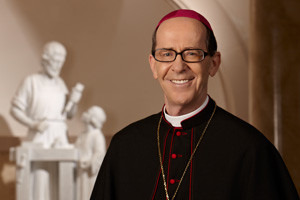The close connection between faith and forgiveness is evident from the beginning of Jesus’ public ministry. His first words recorded by St. Mark resound with this message (Mk 1:15): “This is the time of fulfillment. The Kingdom of God is at hand. Repent, and believe in the Gospel.” And His first words to the Apostles after His Resurrection from the dead pass on to them the mission of forgiving sins in His name (Jn 20:21-23), “Peace be with you. As the Father has sent me, even so I send you… If you forgive the sins of any, they are forgiven; if you retain the sins of any, they are retained.”
New pastoral letter on confession
But why is there a close link between belief in Christ and having our sins forgiven? Because of Who Jesus is and because of who we human beings are. He is the long desired Redeemer of the world, the one who came to save sinners. His very name means “God saves.” And we are those who long to see His face, the ones who, until our sins are blotted out, “walk in darkness and the shadow of death,” waiting for Him to “guide our feet into the way of peace” (Lk 1:79).

This bond between faith and forgiveness explains why, during the Year of Faith, I am writing a pastoral letter to our priests on the Sacrament of Reconciliation, to be issued on Jan. 25, the Feast of the Conversion of St. Paul. In the letter, I shall reflect on three topics:
- the priest as an apostle of mercy,
- the priest’s own experience of receiving forgiveness himself in confession, and
- the priest as a confessor.
The pastoral letter is almost entirely drawn from what I have learned from holy priests who have heard my own confession or have inspired me by their pastoral wisdom and their example of helping others to drink from this rich fountain of God’s mercy.
The joy of forgiving and being forgiven
Among the many duties that Jesus gives to priests, few are as simultaneously humbling and inspiring as hearing confessions. The honesty and courage of penitents give us a glimpse into the heroic efforts they are making to love and to serve Christ with integrity, even when it comes at great cost. We priests also have the joy of knowing that whoever receives God’s mercy in this sacrament also receives the grace to be a steward of His mercy for others.
For good reason, frequent confession is strongly recommended by the Church. Blessed John Paul II urged bishops and priests to provide the greatest possible opportunities for the faithful to confess their sins, and to be sure to adapt the scheduled times for confessions to the real circumstances of penitents. He recommended that confessors be available before Mass and even during Mass where this is feasible.
Jesus told us (Lk 15:7), “…there will be more joy in heaven over one sinner who repents than over ninety-nine righteous people who have no need of repentance.” Joy is the fruit of forgiveness, both for the one being forgiven and the one forgiving. This is why hearing confessions is such a blessing in the life of priests, even though it requires generosity, patience and pastoral charity.
Have you thanked your confessor today?
While I am addressing this soon-to-be-released pastoral letter to our priests, I invite all of the faithful to read it. I also invite you to take this occasion to thank your confessor(s) for being an apostle of mercy for you. I ask you, too, to support all efforts made by our priests to promote this sacrament of forgiveness through preaching, catechesis, and generosity in providing ample time for confessions.
Please thank our priests also for taking time to address the difficult but important topic of sin. Just as Jesus did not hesitate to speak about the sad and destructive reality of evil, so He commands His priests to do the same. Pope Benedict, in his encyclical Caritas in Veritate (#34), explains why teaching about sin is so important: “…ignorance of the fact that man has a wounded nature inclined to evil gives rise to serious errors in the area of education, politics, social action and morals.”
With wisdom, the Holy Father says that the New Evangelization begins in the confessional, in the mysterious encounter between us human beings weighed down by our moral failings and the Lord Jesus who came to call sinners. In Him is the fullness of redemption. He is our peace and joy.





![[VIDEO] Make Sunday feel like Sunday again](https://www.catholicsun.org/wp-content/uploads/2021/04/2021-YOUTUBE-BISHOP-MESSAGE-THUMBNAIL-ENGLISH-218x150.png)
